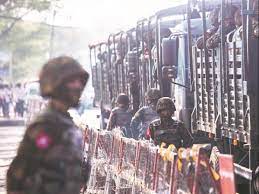International Relations Policy in Myanmar (Opinion)
Although the United States has remained in vocal opposition to the numerous human rights violations and tragedies occurring in the Burma region, our efforts have returned little to no reformation even over this extended period of time. Among these attempts to reduce military power and violence, were various sanctions on companies and individuals with known relations to the military power in Myanmar. Although these sanctions were imposed in conjunction with other major European powers like the United Kingdom and European Union, they have failed to see major results in abating the military tensions.
It is obvious that our current efforts are relatively fruitless, and major reform of our foreign relations policies is necessary in order to see improvement. One option is to impose several more targeted sanctions against entities connected to the military government. This would increase economic pressure, and directly reduce the amount of raw military power. With less potential for an entirely one-sided conflict, diplomacy can play a larger role which is preferable. It also seems possible to separate the economy of Burma citizens from the military faction. This means that sanctions would not have a significant impact on the economic well-being of non-involved citizens and the negative effects would be negligible.
Secondly, a concrete identification of human rights violations would be useful, as these examples would be invaluable in negotiations on the world stage. If international law is broken, it will be much easier to convince other states to place pressure on the conflict. Sanctions are much more effective if the majority of foreign trade is impacted, and some states continue to maintain relations with the government simply out of economic interest. If a humanitarian aspect is introduced to the equation, most companies will be forced to react and potentially withdraw from the region. A formal notice of the full situation will raise awareness of the crisis and can be expected to increase domestic support as well, making the process of implementing new sanctions or actions much easier.
A third option would be to present a formal ban on military or economic assistance. This is a significantly more risky option as it would bring foreign nations closer to the conflict as other states would certainly oppose this proposition. However, the United States possesses enough close allies that would support the motion, and it would likely result in an international embargo on arms and ammunition. Although aggressive, this would secure an abridged conclusion to this never-ending dispute and diplomacy would inevitably become more prevalent as the military would simply not possess as much hard power.
I would recommend an immediate identification of human rights violations and voiced support for the people of Burma. After this step, sanctions can be proposed to international allies and specifically those with close economic ties to the Burmese government. We must extend enough influence to ensure that states agree with our approach, and some aggressive negotiations may be necessary to pass this step. Once this occurs, we should open diplomatic discussions on the world stage and demand an immediate release of political prisoners.
Links :
_
https://www.csis.org/analysis/revisiting-us-policy-myanmar
https://www.atlanticcouncil.org/blogs/new-atlanticist/how-the-us-should-respond-to-the-coup-in-myanmar/
https://www.aljazeera.com/news/2021/8/1/six-months-after-myanmar-coup-battle-for-diplomatic-recognition




I really like the way you offer some, not all, major possible responses to the military regime in Myanmar. Intriguing to read and consider each one. Of course, sanctions are tricky because they often and inevitably impact most the ones with least power. Kudos also for you to step out, which is a risk, and offer your informed thoughts at this time. This post gets at the heart of blogs-be informative and express one's (educated) view(s). Did you see that at the beginning of this week the members of ASEAN ( Brunei, Cambodia, Indonesia, Laos, Malaysia, Myanmar, the Philippines, Singapore, Thailand and Vietnam) are not letting the Myanmar military regime attend their ASEAN meetings BECAUSE THE REGIME HAS FAILED TO HONOR PROMISES IT MADE TO ASEAN LAST SPRING.
ReplyDelete